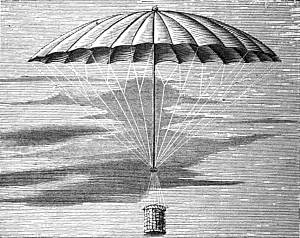Annotation:Pup in the Parachute: Difference between revisions
Created page with "=='''Back to [[{{BASEPAGENAME}}]]'''== ---- <p><font face="garamond, serif" size="4"> '''PUP IN THE PARACHUTE.''' English, Reel. G Major. Standard tuning (fiddle). AABB. The..." |
m Text replacement - "garamond, serif" to "sans-serif" |
||
| Line 1: | Line 1: | ||
=='''Back to [[{{BASEPAGENAME}}]]'''== | =='''Back to [[{{BASEPAGENAME}}]]'''== | ||
---- | ---- | ||
<p><font face=" | <p><font face="sans-serif" size="4"> | ||
'''PUP IN THE PARACHUTE.''' English, Reel. G Major. Standard tuning (fiddle). AABB. The melody appears in the music manuscript copybooks of H.S.J. Jackson (Wyresdale Lancashire, 1823) and J. Winder (Wyresdale, Lancashire, 1835). The title commemorates the demonstration of French inventor Jean-Pierre Blanchard’s (1753-1809) method of escape from his hot air balloons, an invention that took Europe by storm in the 1780’s. In 1785 Blanchard went aloft with a dog as a passenger along with a parachute (developed by Sébastien Lenormand in France) and succeeded in harnessing the animal to the device, then dropping the dog safely to the ground. Blanchard used the parachute himself in 1793 to escape when his hot air balloon ruptured. [[File:BlanchardParachute.jpg|300px|thumb|left|Blanchard's Parachute]] | '''PUP IN THE PARACHUTE.''' English, Reel. G Major. Standard tuning (fiddle). AABB. The melody appears in the music manuscript copybooks of H.S.J. Jackson (Wyresdale Lancashire, 1823) and J. Winder (Wyresdale, Lancashire, 1835). The title commemorates the demonstration of French inventor Jean-Pierre Blanchard’s (1753-1809) method of escape from his hot air balloons, an invention that took Europe by storm in the 1780’s. In 1785 Blanchard went aloft with a dog as a passenger along with a parachute (developed by Sébastien Lenormand in France) and succeeded in harnessing the animal to the device, then dropping the dog safely to the ground. Blanchard used the parachute himself in 1793 to escape when his hot air balloon ruptured. [[File:BlanchardParachute.jpg|300px|thumb|left|Blanchard's Parachute]] | ||
<br> | <br> | ||
<br> | <br> | ||
</font></p> | </font></p> | ||
<p><font face=" | <p><font face="sans-serif" size="4"> | ||
''Source for notated version'': | ''Source for notated version'': | ||
<br> | <br> | ||
<br> | <br> | ||
</font></p> | </font></p> | ||
<p><font face=" | <p><font face="sans-serif" size="4"> | ||
''Printed sources'': Callaghan ('''Hardcore English'''), 2007; p. 46. | ''Printed sources'': Callaghan ('''Hardcore English'''), 2007; p. 46. | ||
<br> | <br> | ||
<br> | <br> | ||
</font></p> | </font></p> | ||
<p><font face=" | <p><font face="sans-serif" size="4"> | ||
''Recorded sources'': <font color=teal></font> | ''Recorded sources'': <font color=teal></font> | ||
</font></p> | </font></p> | ||
Latest revision as of 14:36, 6 May 2019
Back to Pup in the Parachute
PUP IN THE PARACHUTE. English, Reel. G Major. Standard tuning (fiddle). AABB. The melody appears in the music manuscript copybooks of H.S.J. Jackson (Wyresdale Lancashire, 1823) and J. Winder (Wyresdale, Lancashire, 1835). The title commemorates the demonstration of French inventor Jean-Pierre Blanchard’s (1753-1809) method of escape from his hot air balloons, an invention that took Europe by storm in the 1780’s. In 1785 Blanchard went aloft with a dog as a passenger along with a parachute (developed by Sébastien Lenormand in France) and succeeded in harnessing the animal to the device, then dropping the dog safely to the ground. Blanchard used the parachute himself in 1793 to escape when his hot air balloon ruptured.

Source for notated version:
Printed sources: Callaghan (Hardcore English), 2007; p. 46.
Recorded sources:
